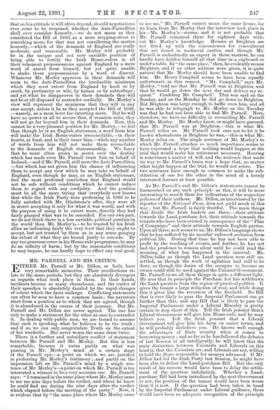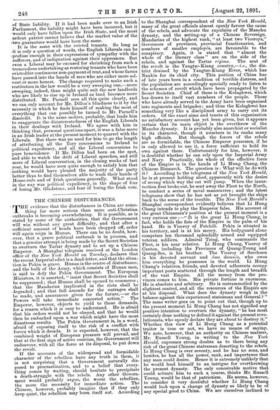MR. PARNELL AND HIS CRITICS.
"EITHER Mr. Parnell or Mr. Dillon, or both, have very remarkable memories. Their recollections re- late to the same periods, but they are absolutely divergent as regards what took place in them. In their hands, incidents become so many chameleons, and the reader of their speeches is absolutely dazzled by the rapid changes of colour which the facts undergo. Conflicting statements can often be seen to have a common basis ; the narrators start from a position as to which they are agreed, though it is abandoned in the course of their journey. But Mr. Parnell and Mr. Dillon are never agreed. The one has only to make a statement for the other at once to contradict it. In dealing with public men, we are bound to assume that each is speaking what he believes to be the truth ; and if so, we can only congratulate Truth on the extent of her wardrobe. She never wears the same dress twice.
There is a further and subsidiary conflict of statement between Mr. Parnell and Mr. Morley. But this is less remarkable, because it turns partly on what was passing in Mr. Morley's mind at a certain stage of the Parnell epic—a point on which we are justified in preferring Mr. Morley's testimony ; and partly on the impression left on Mr. Parnell's mind by a single sen- tence of Mr. Morley's—a point on which Mr. Parnell is too interested a witness to be a very accurate one. Mr. Parnell says : " I remained in the same place where Mr. Morley came to see me nine days before the verdict, and where he knew he could find me during the nine days after the verdict which elapsed before the meeting of the party." Now, it is evident that by " the same place where Mr. Morley came to see me," Mr. Parnell cannot mean the same house, for we learn from Mr. Morley that the interview took place in his—Mr. Morley's—rooms, and it is not probable that Mr. Parnell remained there for eighteen days with- out Mr. Morley's knowledge. Houses at Brighton are not fitted up with the conveniences for concealment that are found in mediaeval castles, and though Mr. Parnell is undoubtedly an expert in these matters, he can hardly have hidden himself all that time in a cupboard or under a table. By "the same place," then, he evidently means Brighton, and if no other address were given, it is quite natural that Mr. Morley should have been unable to find him. Mr. Henry Campbell seems to have been equally unfortunate in this respect. " Mr. Campbell," says Mr. Morley, " told me that Mr. Parnell was at Brighton, and that he would go down the next day and deliver my re- quest." Confiding Mr. Campbell ! This was said on the Sunday, and on the Monday he did go down to Brighton. But Brighton was large enough to baffle even him, and all he was able to telegraph to Mr. Morley on the Tuesday was that he had not been able to find Mr. Parnell. Here, therefore, we have no difficulty in reconciling Mr. Parnell and Mr. Morley. Mr. Morley knew, or might have guessed, that Mr. Parnell was at Brighton,—this is what Mr. Parnell relies on. Mr. Parnell took care not to let it be known whereabouts in Brighton he was,—this is what Mr. Morley relies on. The single sentence of Mr. Morley's to which Mr. Parnell attaches so much importance seems to have expressed a hope that nothing would happen at the trial that would make his retirement necessary. Hearing is sometimes a matter of will, and the sentence that made- its way to Mr. Parnell's brain was a hope that, no matter what might happen at the trial, he would not retire. The two sentences have enough in common to make the sub- stitution of one for the other in the mind of a keenly interested listener at least possible.
As Mr. Parnell's and Mr. Dillon's statements cannot be harmonised on any such principle as this, it will be more interesting to search them for indications of the respective policies of their authors. Mr. Dillon, as interviewed by the reporter of the National Press, does not yield much in this way ; but Mr. Parnell is fairly fruitful. The main things that divide the Irish leaders are three,—their attitude towards the Land-purchase Act, their attitude towards the tenants who have been evicted in consequence of the " Plan of Campaign," and their attitude towards English parties. Upon all three, as it seems to us, Mr. Dillon's language shows that he has suffered by six months' enforced seclusion from political life. During that time he has not been able to profit by the teaching of events, and further, he has not had the prudence to remain silent until he could read the- meaning of what has happened in the interval. Mr. Dillon talks as though the Land question were still un- settled, as though the work of agitation had still to be done, as though the desire of the occupier to become an owner could still be used against the Unionist Government. Mr. Parnell views all these things in quite a different light. He sees that in principle the Purchase Act has withdrawn the Land question from the region of practical politics. It gives the tenant a large reduction of rent, and while doing this it gives him the reversion of the freehold. No Bill that is ever likely to pass the Imperial Parliament can go further than this, and any Bill that is likely to pass the Imperial Parliament under a Liberal Ministry is pretty certain to stop short of this. Tell the Irish peasant that a Liberal Government will give him Home-rule, and be may believe you. Tell the Irish peasant that a Liberal Government will give him his farm on easier terms, and he will probably disbelieve you. He knows well enough the advantages of State security when it comes to borrowing money ; and so far as be has followed the debates of last Session at all intelligently, he will know that the main distinction between Unionists and Liberals on this head is, that the Unionists are, and Liberals are not, willing to hold the State responsible for moneys advanced. If Mr. Dillon had led the Irish Party last Session, he might have been able to defeat the Land-purchase Bill. But the only result of his success would have been to delay the settle- ment of the question indefinitely. Whether a Land- purchase Bill had been introduced by the next Government or not, the position of the tenant would have been worse than it is now. If the question had been taken in hand by the Imperial Parliament under Liberal guidance, there would have been no adequate recognition of the principle of State liability. If it had been made over to an Irish Parliament, the liability might have been incurred, but it would only have fallen upon the Irish State, and the most ardent patriot cannot believe that the market value of the 'two guarantees would have been the same. It is the same with the evicted tenants. So long as 'it is only a question of words, the English Liberals can be 'profuse enough in their expressions of sympathy with the sufferers, and of indignation against their oppressors. But even a Liberal may be excused for shrinking from such a tremendous undertaking as restoring tenants who have been evicted for continuous non-payment of rent, and whose farms have passed into the hands of men who are either more sol- vent or more honest. The change required to make such a restitution in the law would be a very sweeping one,—more sweeping, indeed, than might quite suit the new landlords who are likely to rise up in Ireland as land becomes more distributed. Mr. Parnell sees all this quite clearly, and we can only account for Mr. Dillon's blindness to it by the necessity in which he finds himself of making the most of everything that can possibly be turned to Mr. Parnell's discredit. It is the same motive, probably, that leads him to exaggerate the disinterestedness of the English Liberals in their dealings with Ireland. We agree with him in thinking that, personal questions apart, it was a false move in an Irish leader at the present moment to quarrel with the Liberals. But there was no need for him to go the length of attributing all the Tory concessions to Ireland to political expediency, and all the Liberal concessions to pure benevolence. If Mr. Dillon had been on the spot, and able to watch the drift of Liberal speeches, and still more of Liberal conversation, in the closing weeks of last year, he would have seen quite enough to satisfy him that . nothing would have pleased the majority of the party better than to find themselves able to wash their hands of Home-rule and of Irish questions generally. What stood in the way was political expediency, in the shape of fear . of losing Mr. Gladstone, and fear of losing the Irish vote.



































 Previous page
Previous page